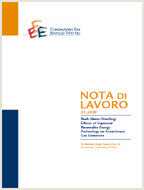The Political Economy of Oil and the Crisis of the Arab State System

Data
20.06.2013
20.06.2013
Autori
Daniel Atzori
Codice JEL
F6, N5, O1, P1, Q3, Q4
F6, N5, O1, P1, Q3, Q4
Parole chiave:
Oil, Energy, Political Economy, MENA, Globalization, Arab Spring
Oil, Energy, Political Economy, MENA, Globalization, Arab Spring
Publisher
Economy and Society
Economy and Society
Editor
Giuseppe Sammarco
Giuseppe Sammarco
This paper argues that the so-called Arab spring is part of a tectonic shift which signals the frailty of the Arab state system as such. Countries benefitting from oil and gas rents have been more resilient, because of their potential to create systems of incentives and disincentives in order to prevent disruptive social change. Islamism, whose emergence is connected with rentier state dynamics is, at the same time, an opportunity and a threat for the survival of the Arab state and, in general, of the Arab states system. In this context, national oil companies can increasingly be conceptualized not merely as instruments of the state, but as bulwarks of nation-state legitimacy in a period of chaos.
